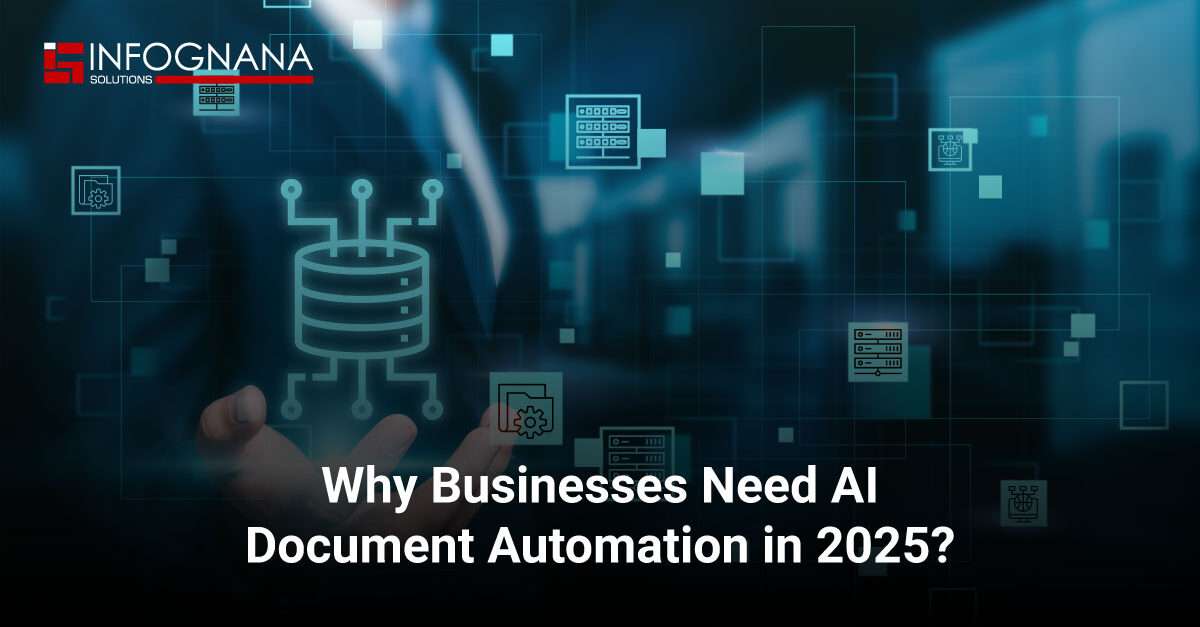Why Businesses Need AI Document Automation in 2025?
Why Businesses Need AI Document Automation in 2025?
Let’s be honest, no one wakes up excited to spend their day wrangling documents. Whether you’re in finance, legal, sales, HR, or IT, chances are a big chunk of your time is swallowed up by document-related tasks. Drafting them. Formatting them. Making sure they’re compliant, on-brand, and approved, and then starting over when something changes. This kind of work is repetitive, often frustrating, and frankly, it’s a massive productivity drain.
But here’s the good news: document processing has come a long way. What used to be a handful of documents to handle has evolved into intelligent systems that can draft, analyze, and deliver client-ready documents using data and rules already sitting inside your business systems, thanks to automation!
AI document automation isn’t about replacing people, it’s about giving them better tools—tools that help them move faster.
So, how does it work, and why should businesses care? Let’s dig in.
What Is AI Document Automation?
At its core, AI document automation is the process of using technology to streamline how documents are created, managed, and distributed. Everything from auto-filling templates, approval workflows, or pre-set formatting rules, it’s a superior workflow automation solution.
But AI supercharges this process. Now, automation isn’t just about speed; it’s about intelligence.
AI systems can:
- Write first drafts using internal data
- Choose the correct templates and content blocks
- Check for tone, brand consistency, and compliance
- Organize and classify documents based on their content and security level
All this happens behind the scenes, so what used to take hours now takes minutes, and what used to be errorsome becomes reliable and repeatable.
How Does Document Automation Work?
Here’s what’s going on in today’s smarter document automation tools:
1.Data Extraction
Instead of copying and pasting customer details or pricing info into a document, AI can automatically pull this data from your internal systems, like your CRM, ERP, or legal database. Our Cognitive Data Extractor (CDE) extracts data from unstructured, legacy systems and converts it into actionable insights.
2.Document Classification
AI sorts documents by type (proposal, contract, invoice, and more) and even by sensitivity level. This helps teams stay organized and ensures the right people have access (and others don’t).
3.Content Analysis
Before a document gets sent, AI checks it for tone, formatting, brand guidelines, and even regulatory compliance, reducing the need for lengthy review cycles.
4.Dynamic Content Generation
Using templates and metadata, the system can create full documents from scratch—think reports, proposals, contracts, and emails—tailored to the audience, the use case, and your brand voice.
Importance of Document Automation for Businesses
Now that we know what AI document processing can do, let’s talk about why it matters, especially in today’s fast-paced, margin-conscious business world.
1.Time Saved Is Money Saved
Manual document work takes time, often way more than we realize. Between data entry, formatting, approvals, and edits, employees spend hours each week on tasks that could be automated.
By eliminating those time drains, businesses free up their teams to focus on high-impact work. Gartner, for example, estimates that automation can save finance departments alone over 25,000 hours of paperwork per year.
That’s not just time saved. That’s thousands of decisions made faster, emails replied to sooner, and customers helped quicker.
2.Operational Efficiency Gets a Boost
When your documents are automated, your processes become smoother. No bottlenecks. No confusion over version control. No last-minute scrambles to find the right clause or update pricing data.
AI also reduces the need for back-and-forth between departments. Documents are generated using the latest approved data, content, and formatting, so legal, marketing, and operations are all aligned from the start.
And if you’re working with a global team or client base, AI can even help with instant document translation or localization, removing yet another manual task from your plate.
3.Improved Customer Experience
Fast, accurate communication is key to a great customer experience. But if your inbox is overflowing, and you’re still sorting through templates and files, your response times—and your service—will suffer.
Document processing automation helps teams with workflow automation by replying faster and more consistently. Need a proposal? It’s done in minutes. Need a customer onboarding packet? Just click generate.
One study found that most customer emails go unanswered for more than 12 hours, even though most customers expect a reply within 1–4 hours. Automation helps close that gap and win more trust.
4.Fewer Errors, Lower Risk
Mistakes in documents, whether it’s a wrong price, outdated legal language, or a typo in a client’s name, can lead to confusion, lost deals, or even legal trouble.
AI systems apply consistent rules every time, so even high-volume, complex documents stay accurate. They also reduce risk by automatically flagging missing data, out-of-date content, or compliance issues before anything goes out the door.
Infognana Solutions, Your Document Automation Service Partner
Because the future of business documents isn’t manual—it’s intelligent. If your team is still buried in documents, now’s the time to take a closer look at what automation can do. Our automation experts at Infognana Solutions have built document automation tools for data digitization, data extraction services, workflow automation, and more, that’ll help you work faster and better. Talk to us today!



